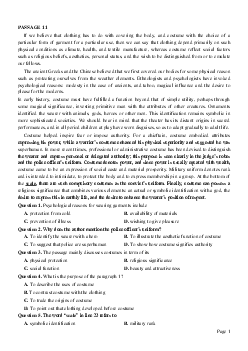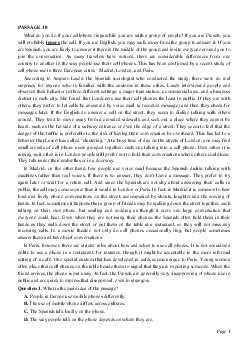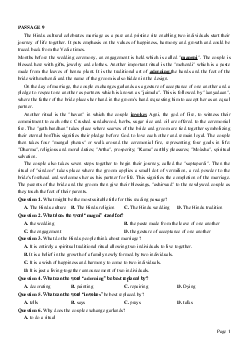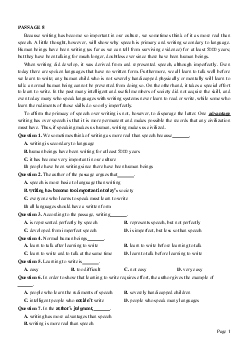



Preview text:
Read the following passage and mark the letter A, B, C or D on your answer sheet to indicate the
correct answer to each of the questions from 1 to 8.
Psychologists have debated a long time about whether a child’s upbringing can give it the ability to do
outstandingly well. Some think that it is impossible to develop genius and say that it is simply something
a person is born with. Others, however, argue that the potential for great achievement can be developed.
The truth lies somewhere between these two extremes.
It seems very obvious that being born with the right qualities from gifted parents will increase a child’s
ability to do well. However, this ability will be fully realized only with the right upbringing and
opportunities. As one psychologist says, “To have a fast car, you need both a good engine and fuel.”
Scientists have recently assessed intelligence, achievement, and ability in 50 sets of identical twins that
were separated shortly after birth and brought up by different parents. They found that achievement was
based on intelligence, and later influenced by the child’s environment. One case involving very intelligent
twins was quoted. One of the twins received a normal upbringing, and performed well. The other twin,
however, was brought up by extremely supportive parents and given every possible opportunity to
develop its abilities. That twin, though starting out with the same degree of intelligence as the other,
performed even better. This case reflects the general principle of intelligence and ability. The more
favorable the environment, the more a child’s intelligence and ability are developed. However, there is
no link between intelligence and the socioeconomic level of a child’s family. In other words, it does not
matter how poor or how rich a family is, as this does not affect intelligence.
Gifted people cannot be created by supportive parents, but they can be developed by them. One professor
of music said that outstanding musicians usually started two or three years earlier than ordinary
performers, often because their parents had recognized their ability. These musicians then needed at least
ten years’ hard work and training in order to reach the level they were capable of attaining. People who
want to have very gifted children are given the following advice:
- Marry an intelligent person.
- Allow children to follow their own interests rather than the interests of the parents.
- Start a child’s education early but avoid pushing the child too hard.
- Encourage children to play; for example, playing with musical instruments is essential for a child who
wants to become an outstanding musician.
Question 1. The upbringing of highly intelligent children requires .
A. an expensive education
B. good musical instruments
C. parental support and encouragement
D. wealthy and loving parents
Question 2. The word “others” used in the first paragraph refers to . A. other people B. other scientists C. other children D. other geniuses
Question 3. When scientists studied intelligence and ability in twins, they found that .
A. ability depends mainly on intelligence and achievement
B. intelligence and development are irrelevant to ability
C. ability depends both on intelligence and on environment
D. different twins generally have different levels of ability
Question 4. Scientists chose twins for their study because .
A. each twin has the same environment as his/her twin Page 1
B. they are born into the same family, hence the same upbringing
C. they have the same economic background and hence the same opportunities
D. they have the same genetic background, usually with similar intelligence
Question 5. How were great musicians different from ordinary musicians in their development?
A. Their ability was realized at an early stage and then nurtured.
B. They practice playing their instruments for many years.
C. They concentrated on music to the exclusion of other areas.
D. They were exceptionally intelligent and artistic.
Question 6. The remark: “To have a fast car, you need both a good engine and fuel.” in the passage
means that in order to become a genius .
A. you need to have good health and good nourishment
B. you need intelligence and you need to develop it
C. you should try to move quickly and efficiently
D. you must nourish your brain and train your muscles hard
Question 7. The word “favorable” in the passage mostly means .
A. “good for someone and making him/her likely to be successful”
B. "helping somebody to be more intelligent compared to other people”
C. “of high quality or an acceptable standard”
D. “under the control or in the power of somebody else”
Question 8. All of the following statements are true EXCEPT .
A. a child’s intelligence is influenced by that of his/ her parents
B. to become successful, a child needs both native intelligence and development
C. studying different twins is a useful scientific procedure
D. educational development depends completely on economic well-being. Page 2 ĐÁP ÁN 1-C 2-B 3-C 4-D 5-A 6-B 7-A 8-D
LỜI GIẢI CHI TIẾT Question 1: C
Gifted people cannot be created by supportive parents, but they can be developed by them. Allow
children to follow their own interests rather than the interests of the parents. Encourage children to play…..
2 ý A, D không được đề cập; ý B chỉ là một ví dụ. Question 2: B
Psychologists have debated a long time ..... Some think that Others, however, argue that
-> Các nhà tâm lý học đã tranh luận rất lâu về vấn đề ... một số người cho rằng. tuy nhiên, những người khác lại cho rằng. ...
-> Others: các nhà tâm lý học Question 3: C
Dẫn chứng: “They found that achievement was based on intelligence, and later influenced by the child's
environment.” (Họ phát hiện ra rằng thành tích này phụ thuộc vào trí thông minh, và sau đó chịu sự ảnh
hưởng của môi trường sống.) Question 4: D
Thí nghiệm thực hiện trên các cặp sinh đôi cùng trứng nhằm mục đích khảo sát những đứa bé giống nhau
về gen – từ đó giống nhau về khả năng, trí thông minh bẩm sinh; từ đó sự khác nhau trong thành tựu của 2
đứa bé sẽ phụ thuộc vào môi trường nuôi nấng. Question 5: A
Dẫn chứng: “…outstanding musicians usually started two or three years earlier than ordinary performers,
often because their parents had recognized their ability. These musicians then needed at least ten years'
hard work and training in order to reach the level they were capable of attaining.” (…những nhạc sĩ xuất
sắc thường bắt đầu sớm hơn hai hoặc ba năm so với người bình thường, thường là do cha mẹ của họ đã
nhận ra được khả năng của con cái. Những nhạc sĩ sau đó cần học tập chăm chỉ và được đào tạo ít nhất là
mười năm để vươn tới trình độ họ có khả năng đạt được.) Question 6: B
you need intelligence and you need to develop it = Bạn muốn có trí thông minh thì bạn cần phải phát triển nó Question 7: A
Favorable (a): tốt cho ai đó, giúp ai thành công. Question 8: D
Dẫn chứng: “However, there is no link between intelligence and the socioeconomic level of a child’s
family. In other words, it does not matter how poor or how rich a family is, as this does not affect
intelligence.” (Tuy nhiên, không có mối liên hệ nào giữa trí hong minh và mức độ kinh tế xã hội trong gia Page 3
đình của một đứa trẻ. Nói cách khác, cho dù gia đình có giàu hay nghèo đi chăng nữa thì cũng không ảnh
hưởng đến trí hong minh.) câu D sai BÀI DỊCH
Các nhà tâm lý học đã tranh cãi một thời gian dài về việc liệu nuôi dưỡng một đứa trẻ có thể mang lại cho
nó có khả năng nổi bật không. Một số người nghĩ rằng không thể phát triển một thiên tài và nói rằng nó
chỉ đơn giản là một cái gì đó một người được sinh ra đã có. Tuy nhiên, những người khác lập luận rằng
tiềm năng cho thành tựu to lớn có thể được phát triển. Sự thật nằm ở đâu đó giữa hai thái cực này.
Dường như rất rõ ràng rằng sinh ra với những phẩm chất đúng đắn từ cha mẹ có năng khiếu sẽ làm tăng
khả năng làm tốt của một đứa trẻ. Tuy nhiên, khả năng này sẽ được phát triển đầy đủ chỉ với sự nuôi dạy
và cơ hội đúng đắn. Như một nhà tâm lý học đã nói, "Để có một chiếc xe nhanh, bạn cần cả một động cơ và nhiên liệu tốt."
Các nhà khoa học gần đây đã đánh giá trí thông minh, thành tích và khả năng trong 50 cặp song sinh đã
được tách ra ngay sau khi sinh và được nuôi dạy bởi các bậc cha mẹ khác nhau. Họ nhận thấy rằng thành
tích dựa trên trí thông minh, và sau đó chịu ảnh hưởng của môi trường của đứa trẻ. Một trường hợp liên
quan đến cặp song sinh rất thông minh đã được trích dẫn. Một trong hai đứa trẻ sinh đôi đã nhận được
một cuộc sống bình thường, và thể hiện tốt. Tuy nhiên, đứa trẻ song sinh còn lại đã được nuôi dưỡng bởi
các bậc cha mẹ hỗ trợ và cho mọi cơ hội để phát triển khả năng của mình. Đứa trẻ song sinh đó, mặc dù
bắt đầu với cùng mức độ thông minh như người kia, đã thể hiện tốt hơn. Trường hợp này phản ánh
nguyên tắc chung về trí tuệ và khả năng. Môi trường thuận lợi hơn, trí tuệ và khả năng của đứa trẻ được
phát triển hơn. Tuy nhiên, không có mối liên hệ nào giữa trí tuệ và trình độ kinh tế xã hội của gia đình trẻ.
Nói cách khác, không quan trọng là gia đình nghèo hay giàu có như thế nào, vì điều này không ảnh hưởng đến trí thông minh.
Những người có năng khiếu không thể được tạo ra bởi cha mẹ ủng họ chúng, nhưng họ có thể được phát
triển bởi họ. Một giáo sư âm nhạc nói rằng các nhạc sĩ xuất sắc thường bắt đầu hai hoặc ba năm trước đó
hơn những người biểu diễn thông thường, thường vì bố mẹ chúng đã nhận ra khả năng của chúng. Những
nhạc công này sau đó cần ít nhất mười năm làm việc và đào tạo chăm chỉ để đạt được mức độ họ có khả
năng đạt được. Những người muốn có những đứa con rất năng khiếu được đưa ra lời khuyên sau:
- Kết hôn với một người thông minh.
- Cho phép trẻ em làm theo sở thích của mình chứ không phải vì ý thích của cha mẹ.
- Bắt đầu giáo dục sớm nhưng tránh thúc đẩy đứa trẻ quá nhiều.
- Khuyến khích trẻ chơi; Ví dụ như chơi nhạc cụ là điều cần thiết cho một đứa trẻ muốn trở thành một nhạc sĩ xuất sắc. Page 4




